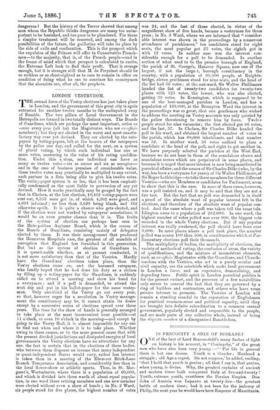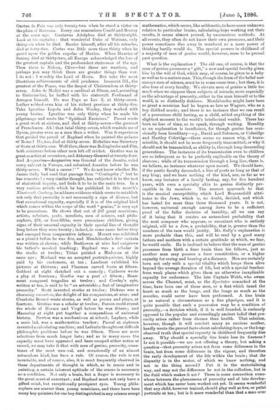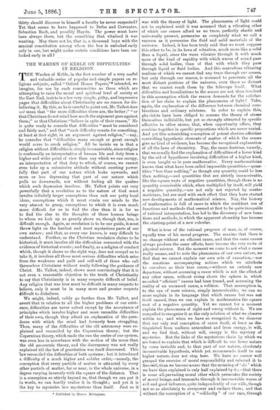IS PRECOCITY A SIGN OF DISEASE?
ONE of the best of Lord Beaconsfield's many flashes of light on history is his account, in " Coningsby," of the great men who have also been very young :—" ' For life in general there is but one decree. Youth is a blunder ; Manhood a struggle ; old Age a regret. Do not suppose,' he added, smiling, ' that I hold that youth is genius ; all that I say is, that genius, when young, is divine. Why, the greatest captains of ancient and modern times both conquered Italy at five-and-twenty ! Youth, extreme youth, overthrew the Persian Empire. Don John of Austria won Lepanto at twenty-five—the greatest battle of modern time; had it not been for the jealousy of Philip, the next year he would have been Emperor of Mauritania. Gaston de Foix was only twenty-two when he stood a victor on the plain of Ravenna. Every one remembers Conde and Rocroy at the same age. Gustavus Adolphus died at thirty-eight. Look at his captains : that wonderful Duke of Weimar, only thirty-six when he died. Banier himself, after all his miracles, died at forty-five. Cortes was little more than thirty when he gazed upon the golden cupolas of Mexico. When Maurice of Saxony died at thirty-two, all Europe acknowledged the loss of the greatest captain and the profoundest statesman of the age. Then there is Nelson, Clive—but these are warriors, and perhaps you may think there are greater things than war. I do not : I worship the Lord of Hosts. But take the most illustrious achievements of civil prudence. Innocent III., the greatest of the Popes, was the despot of Christendom at thirty- seven. John de Medici was a cardinal at fifteen, and, according to Guicciardini, he baffled with his statecraft Ferdinand of Arragon himself. He was Pope as Leo X. at thirty-seven. Luther robbed even him of his richest province at thirty-five. Take Ignatius Loyola and John Wesley, they worked with young brains. Ignatius was only thirty when he made his pilgrimage and wrote the " Spiritual Exercises." Pascal wrote a great work at sixteen, and died at thirty-seven—the greatest of Frenchmen. Ah ! that fatal thirty-seven, which reminds me of Byron, greater even as a man than a writer. Was it experience that guided the pencil of Raphael when he painted the palaces of Rome ? He, too, died at thirty-seven. Richelieu was Secretary of State at thirty-one. Well then, there was Bolingbroke and Pitt, both ministers before other men left off cricket. Grotius was in great practice at seventeen, and Attorney-General at twenty-four. And Acquaviva—Acquaviva was General of the Jesuits, ruled every cabinet in Europe, and colonised America before he was thirty-seven. What a career ! ' " We do not know whether Mr. James Sully had read that passage from " Coningeby ;" but he has conceivel a very similar thought, has subjected it to the test of statistical inquiry, and finds it to be in the main true. In a very curious article which he has published in this month's Nineteenth Century, he adduces evidence which seems to establish not only that precocity is not necessarily a sign of disease, but that exceptional capacity, especially if it is of the original kind which comes within the scope of the word " genius," is very apt to be precocious. He shows that out of 287 great musicians, artists, scholars, poets, novelists, men of science, and philo- sophers, 231, or four-fifths, were precocious children, giving signs of their unusual capacity in their special line of thought long before they were twenty ; indeed, in some cases before they had emerged from comparative infancy. Mozart was exhibited as a pianist before he was five, and Mendelssohn's first cantata was written at eleven ; while Beethoven at nine had outgrown his father's musical teaching ; Raphael was a scholar in the studio at twelve ; Titian painted a Madonna at the same age ; Morland was an • accepted portrait-painter, highly paid by his customers, at ten ; Landseer exhibited his pictures at thirteen ; and Flaxxnan carved busts at fifteen. Goldoni at eight sketched out a comedy ; Calderon wrote a play at fourteen ; Goethe was a poet at fifteen ; Beau- mont composed tragedies at twelve ; and Cowley's epic, written at ten, is said to be "an astonishic feat of imaginative precocity." Scott invented stories at twelve ; Dickens was a charming raconteur, the delight of his companions, at nine ; and Charlotte Bronto wrote stories, as well as poems and plays, at fourteen. Grotius was a scholar at twelve ; Porson could repeat the whole of Horace and Virgil before he was fifteen ; and Macaulay at eight put together a compendium of universal history. Newton was a mechanician at school; Laplace, while a mere lad, was a matheinatica, teacher ; Pascal at eighteen invented a calculating machine; and Leibnitz thought out difficult philosophic problems before he was fifteen. These are mere selections from much longer lists; and as in many cases the capacity must have appeared and have escaped either notice or record, we may take it that with men of genius, precocity, some- times of the moat unu-ual, and occasionally of an almost miraculous kind, has been a rule. Of course, the rule is not invariable, and of course, also, it is most frequently observed in those departments of thought in which, as in music and in painting, a certain inherent aptitude of the senses is necessary awe condition. Not only a brain, but a finger is necessary to the great musical execntant ; and Raphael must not only have .a gifted mind, but exceptionally percipient eyes. Young philo- sophers are scarcer than young musicians, and there have been many boy-painters for one boy distinguished in any science except
mathematics, which seems, like arithmetic, to have some unknown relation to particular brains, calculating-boys working out their results, it seems almost proved, by unconscious methods. At all events, they often do not know their own processes, and their power sometimes dies away in manhood as a mere power of thinking hardly would do. The special powers in childhood of a majority of men of genius would, however, seem to be proved past question.
What is the explanation ? The old one, of course, is that the man of genius possesses a " gift," a new and special faculty given him by the will of God, which may, of course, be given to a baby as well as to a mature man. This, though the form of the belief now annoys men of science, must be in some sense true ; but then, it is also true of every faculty. We elevate men of genius a little too much when we suppose them subjects of miracle, more especially as the advantage of precocity, either to the man himself or to the world, is so distinctly dubious. Mendelssohn might have been as great a musician had he begun as late as Wagner, who as a boy disliked music; and there is no instance that we can recall of a precocious child having, as a child, added anything of the slightest moment to the world's intellectual wealth. There has been no loss of time, so to speak, through waiting. Heredity as an explanation is insufficient, for though genius has occa- sionally been hereditary—e.g., David and Solomon, or Coleridge and Hartley Coleridge—there seems no reason why, if trans- missible, it should not be more frequently transmitted, or why it should not be transmitted, as ability is, through long-descending generations. The instances of its transmission even to children are so infrequent as to be perfectly explicable on the theory of chances ; while of its transmission through a long line, there is, we believe, no instance whatever upon record. We should have, if the poetic faculty descended, a line of poets as long as that of any king; and we have nothing of the kind, nor, so far as we know, any instance of a family lasting, say, for five hundred years, with even a specialty akin to genius distinctly per- ceptible in its members. The nearest approach to that is the musical susceptibility which Lord Beaconsfield attri- butes to the Jews, which is, no doubt, decided, and which has lasted for more than three thousand years. It is not, however, universal enough among Jews to be a sufficient proof of the fuller doctrine of heredity, all we can say of it being that it creates an antecedent probability that the next composer who appears, or exec-latent who is entirely original, will be a Jew, a probability, that is, greater than the numbers of the race would justify. Mr. Sully's explanation is more probable than this, and will be read by a good many fathers and mothers with a certain gratitude at which, we fear, he would smile. He is inclined to believe that the man of genius possesses from birth a finer brain than his fellows, just as another man may possess a finer constitution, or a higher capacity for seeing and hearing at a distance. Men are certainly born not only with a special vitality which keeps them alive beyond the average duration of life, but with a special freedom from weak places which gives them an otherwise inexplicable capacity for endurance. The late Captain Webb, who swam across the Channel, must, as the Spectator remarked at the time, have been one of these men, or a feat which taxed the heart as much as the lungs, and the lungs as much as the muscles, could never have been performed. A fine brain is as natural a circumstance as a fine physique, and it is quite possible that such a possession may be a condition of precocity,—a decision which, if it is well founded, is curiously opposed to the popular and exceedingly ancient belief that pre- cocity arises rather from disease than health. That solution, however, though it will comfort many an anxious mother, hardly meets the proved facts about calculating-boys, or the long- observed truth that special capacity in childhood frequently dies away. Why should a specially fine brain lose its fineness ? Is not it possible—we are not offering a theory, but asking a question—that precocity arises not from some difference in the brain, but from some difference in the vigour, and therefore the early development of the. life within the brain ; that the disparity is in the motor, of which we know nothing, and not in the thing moved ? Put it in the materialising way, and may not the difference be not in the collodion, but in the fluid which makes it act ? There is some connection some- where between the phenomena of precocity and of late develop- ment which has never been worked out yet. It seems wonderful that any child, however trained, should play well at five, or paint portraits at ten ; but is it more wonderful than that a man over
thirty should discover in himself a faculty he never suspected? Yet that seems to have happened to Defoe and Cervantes, Sebastian Bach, and possibly Haydn. The power must have been always there, but the something that vitalised it was wanting. May there not be, that is, a thousand boys with the musical constitution among whom the box is unlocked early only in one, but might under certain conditions have been un- locked early in all ?




































 Previous page
Previous page